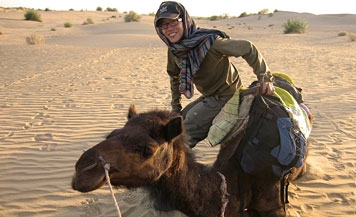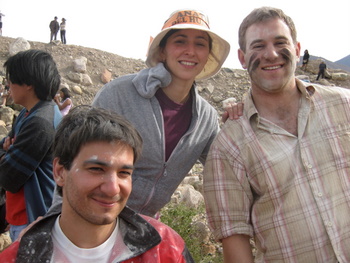Feinberg Students Give Back, Make International Impact with Global Health
Whether they go abroad to perform research, provide clinical care or focus on public health issues, Feinberg School of Medicine students, residents and faculty have an impact on people and policies all over the world. The medical school’s Center for Global Health identifies the health needs of countries with limited resources and provides educational and training opportunities that aim to strengthen the infrastructure and optimize care for citizens in these areas.
Since its inception in November 2008, more than 40 students have received funding to participate in these programs. Funds are provided through the Department of Family and Community Medicine’s Global Health Education and Community Services and the Northwestern University Office of International Program Development. This support provides members of the Feinberg community with an opportunity to pursue volunteer medical service while contributing to the globalization of the medical school.
“Global health is an important part of the medical education at Feinberg,” says Robert Murphy, MD, John Phillip Phair Professor of Infectious Disease at the Feinberg School, attending physician in infectious disease at Northwestern Memorial Hospital and founding director of the Center. “As the world becomes a smaller, more connected place, global issues such as SARS and HIV become local issues very quickly.”
These programs are also important to the medical school because students are looking to obtain international health exposure at some point in their training, Murphy adds. After all, even developed countries face epidemics and even pandemics like the ongoing H1N1 outbreak. These experiences open students’ eyes to issues that plague people abroad and at home and teach them valuable lessons that enhance their Feinberg education.
Following are snapshots of two students’ experiences through the center:
 |
|
| Anthony Cheng, M2, in India. |
A Caravan of Care
Prior to beginning his MD education at Feinberg, Anthony Cheng, now a second year medical student, traveled to India to spend the summer fulfilling the mission of global health. Cheng was part of a medical camp that traveled from New Delhi to Dharamshala, providing care to the geographically isolated and economically neglected populations along the way. Since he had no clinical experience, Cheng spent most of his time in the triage tent, administering patients’ vitals and directing them to the appropriate areas for medical or dental care.
“While I learned to distinguish normal lung sounds and others around me made diagnoses, I came to truly appreciate the magnitude of medical training,” Cheng said.
Throughout his time in India, Cheng’s admiration for the medical profession and his mentors matured, and he learned the importance of surrounding himself with people he desires to emulate. While he was inspired by many of physicians on his team, Cheng was also panged by the realities faced by the patients they cared for.
“I realized that making a positive impact is not as simple as dispensing a truckload of vitamins,” Cheng said. “What impression did we give our patients about the efficacy of their own health care system when we descend upon them in our white trucks and dole out medications in fancy packages?”
Since his return, Cheng has been helping develop a solution to the scenario posed by that question. He became a member of Northwestern University Alliance for International Development (NU-AID) and joined its sustainability committee, hoping that he can aid the attempts of global health programs striving to leave a lasting influence on the populations they serve.
 |
|
| Samuel Cohen (right), M4, with Julian (left), an intensive care unit physician, and Florencia, an infectious disease specialist, at Carnaval in Tilcara, Argentina. |
Medicine in Translation
Following his third year, Samuel Cohen, now a fourth year medical student, took a one-year hiatus from Feinberg to explore what it’s like to practice medicine without resources. Cohen spoke little Spanish when he arrived in San Salvador de Jujuy, Argentina to assist in providing clinical care to patients at Hospital San Roque.
“I learned how to conduct interviews and examine patients that spoke another language,” Cohen said. “Prior to my global health experience, I was considering practicing primary care for Spanish-speaking people; my time in Argentina affirmed this interest.”
While in Argentina, Cohen learned how to practice medicine in a health care system that didn’t have access to the same technology, ancillary staff or educational resources that he had become accustom to in the United States. He was also taught how to perform procedures that he otherwise wouldn’t have learned until residency.
“Dealing with a diverse demographic of patients required a broader differential diagnosis, often including disease processes that would not be considered in the U.S.,” Cohen said. “This less developed health care system certainly tested my medical skills.”
Back volunteering in a Chicago clinic, Cohen is grateful for the skills he learned at Hospital San Roque and says this global health opportunity improved his ability to care for the needs of patients who come from a world completely different from the one he had spent all of his life in.






